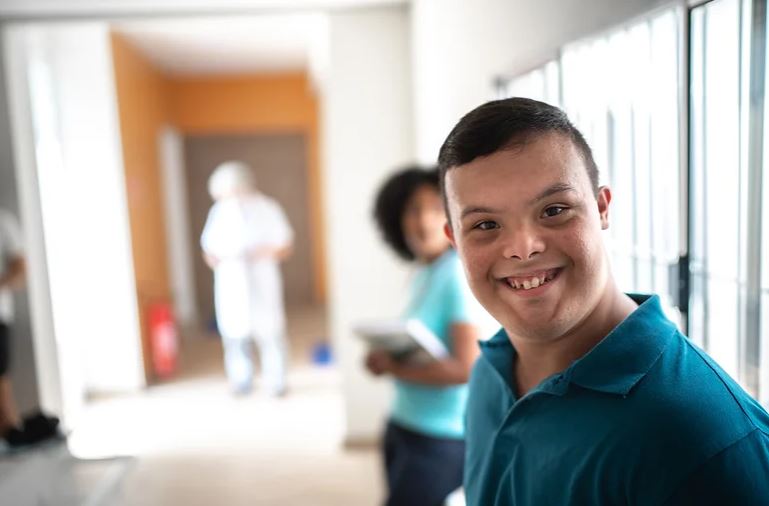Top Ways to Help Your High Schooler with an Intellectual Delay or Disability Succeed in School
September 28, 2021

When it comes to understanding the education system and setting students up for success, parents of teens with developmental delays or disabilities face an array of considerations that other parents don’t. Why? Because these students and their parents are expected to navigate within infrastructures that weren’t specifically built for them.
The key to success for high school students with intellectual and developmental disabilities (I/DD) is identifying the right strategies, supports and resources that will keep teenage students engaged, invested in school and poised for success both in the classroom and life after graduation.
Here are a few of the most impactful ways to help your high schooler with an I/DD enjoy and succeed in high school, along with local resources that can support you along the way.
Build and Fortify Social Skills
Students with I/DD who develop appropriate social skills are far more likely to build positive teacher and peer relationships, a desire to participate and achieve in social and educational settings, and the confidence and self-esteem to carry them beyond the classroom and into the community. Therefore, it is important that social skills are learned, practiced and maintained throughout school and beyond, as they will lay the foundation for personal and professional success, fulfillment and overall quality of life.
Here are a few ways to help your teenager build social skills:
- Explore volunteer opportunities in your community
- Encourage involvement in school clubs
- Learn if your child’s school participates in a Unified Sports Team and consider involvement in sports.
Colorado resources for building social skills:
- Star Center: The international leader for research, treatment, and education related to sensory integration and processing. www.sensoryhealth.org
- Thrive: Helps people overcome barriers and work their way to self-sufficiency through employment. www.thrivecolorado.org
- REVEL: A supportive and inclusive community where people of all abilities can connect, work, learn, and explore new interests together. www.revelinlife.org
Encourage Student Involvement in IEP and Transition Meetings
In the United States, the Individuals with Disabilities Education Act (IDEA) plays a significant role in the education of students with disabilities and ensures that each student up to the age of 21 has an individualized education program (IEP). This IEP, a personalized educational roadmap that details learning objectives and goals, as well as the tools, services and supports needed to achieve those specified goals, are developed and monitored by a multidisciplinary team that meets at least once per year to monitor results and progress. And, by the time a student reaches the age of 14, the IEP team should also start devising a transition plan to help identify areas of interest and prepare students for life after high school.
- IEP Meetings: Although students are invited to attend their IEP meetings, many are left out of the process, but should be included as early as it is deemed appropriate. These meetings can be highly formative, and they are a wonderful opportunity for students to personally discuss their strengths, weaknesses, and needs, as well as review what worked well in the previous year, what didn’t work, and what additional or different accommodations may be needed for the year to follow.
- Transition Planning: In addition to encouraging student involvement in their IEP meetings, it is just as important that they are invited to take an active role in their transition plan. When leaving high school, students with I/DD should have a firm grasp on preferences, strengths, and weaknesses, and be capable of self-advocating and making life choices. However, if left out of the transition plan process, these details may not be reflective of what the student wants or is even prepared to do, which can lead to significant challenges down the road.
Once devised, it’s important to confirm that the language in your teen’s IEP and transition plan is written in a language that he or she can clearly understand, reference and monitor as needed and when appropriate. It’s also a good idea to talk to your teen’s transition staff to identify potential opportunities that can help them discover or prepare for life after high school, such as relevant volunteer or job coaching opportunities.
Colorado resources for special education advocacy:
- Advocacy Denver: Provides advocacy and legal representation to the parents of students with disabilities in the special education system. www.advocacydenver.org
- Thrive Center Transition Services: Helps to ensure appropriate transition services to enable students to develop the skills needed for independent living in their adult life.
Emphasize Self-Care and Wellness
The concept of wellbeing and mental health has taken center stage in our communities in recent years, and self-care is highly encouraged for parents of children and students with I/DD. But it is just as important, if not more so, that the students themselves prioritize their emotional and mental health. Activities such as yoga and mindfulness programs can help to alleviate stress, exercise the body, expand horizons, and achieve a sense of calm, even in the most stressful of times. Fortunately, there are organizations that specialize in accessible self-care programs and classes made available to people of all abilities.
Colorado resource for self-care and wellness:
- Guided by Humanity: Provides health and wellness opportunities that are accessible to everyone, regardless of ability or background. www.guidedbyhumanity.org
Prioritize Life Skills and Job Readiness
Students with I/DD often need extra support in developing life skills, ranging from learning how to make meals, how to follow a daily or weekly schedule, or how to take public transportation. These skills, which can also include shopping for groceries, doing laundry, or maintaining personal hygiene, are important for individuals who plan to live in a modern community, so it is key that they are taught before that transition is made.
Job readiness is also an important indicator of success in your teen’s pending professional life. In fact, one of the most important things students and young adults with disabilities can do to boost their employment opportunities and outcomes is to understand their options and undergo job readiness or vocational training.
Colorado job coaching and job readiness resources:
- Division of Vocational Rehabilitation (DVR): Vocational guidance and counseling, training, job searching skills, job coaching and more.
- Celebrate EDU: Empowers people with disabilities through online business and entrepreneurship education. www.celebrateedu.org
Work with an Advocate
The Family Support Services Program at Rocky Mountain Human Services provides individualized supports and services for families who care for a family member with developmental delays or disabilities, such as:
- Provide advocacy for you and your student
- Connect you to community resources
- Participate in your teen’s IEP meeting
- Help you navigate various systems
- Offer support to you throughout your child’s education and through the years that follow







